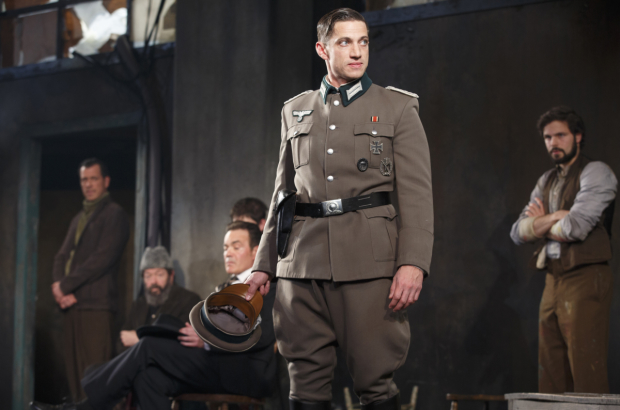Incident at Vichy

(© Joan Marcus)
In 2012, President Obama referred to a “Polish death camp” when posthumously awarding the Presidential Medal of Freedom to Jan Karski, a hero of the Polish resistance to Nazi occupation. The uproar in Poland was immediate: “When someone says ‘Polish death camps,’ it is as if there were no Nazis, no German responsibility,” then Polish Prime Minister Donald Tusk reacted angrily, prompting Obama to correct his statement. Obviously, the Nazis were the primary perpetrators of the Holocaust, but just as there were brave resistance fighters like Karski in Poland, there were also thousands of collaborators and even more who turned a blind eye to Nazi atrocities. It’s about those people that Arthur Miller wrote Incident at Vichy, his 1964 one-act about French collaboration with Nazi Germany, now receiving a lavish (if somewhat underwhelming) production at Signature Theatre.
Taking place entirely inside a makeshift detention center in Vichy, France, circa 1942, the play is about 10 men who have been picked up by French police to be questioned by German officers. Lebeau (a skittish Jonny Orsini) thinks it’s because they’re Jewish. Businessman Marchand (a cold and congested John Procaccino) insists it is just a routine identity check to weed out forged documents. French combat officer Leduc (a commanding and prosecutorial Darren Pettie) is outraged, while actor Monceau (a deceptively haughty Derek Smith) trusts his confidence will see him through. All of them envy Prince Von Berg (an elegant Richard Thomas with a perfect continental English accent), an Austrian nobleman almost certainly there by mistake. Rumors of camps and furnaces swirl as the detainees disappear, one by one.
“I work in the railroad yards,” says Communist electrician Bayard (a forceful Alex Morf). “A thirty¬car freight train pulled in yesterday. The engineer is Polish, so I couldn’t talk to him, but one of the switchmen says he heard people inside.” Considering its direct implication of the French state in abetting the Holocaust, the play’s checkered production history is unsurprising. It took nearly 20 years to receive a French production, and when it did, the critics were sharply reactionary in their responses. The 17-person cast of this 75-minute play also makes it financially unwieldy, helping to explain why it is rarely mounted. We should be thankful that Signature Theatre has taken up the task, even if the visually striking results seem lacking in urgency.
Director Michael Wilson has given the play a spectacularly realistic mise-en-scène, complete with a soaring ceiling and industrial windows blocked out by old newspaper (detailed scenery by Jeff Cowie). David C. Woolard’s costumes are authentic to the period, featuring well-tailored suits (Monceau’s color scheme is especially nice) for the detainees and knee-high jackboots for the captors. David Lander puts on an enticing shadow play from the veiled window of the office in which the interrogations are taking place, leading us to imagine the horrors happening inside. Sound designer John Gromada gives us more of an idea with the sound of a flashbulb; a train’s deafening whistle in the final moments makes it undeniable. None of this would look out of place in a Holocaust museum.
Rather than a historical docudrama, however, Incident at Vichy is meant to question modern audiences about their personal culpability in injustice. “It’s about today,” Miller told the New York Times, ”of seeing in oneself the capacity for collaboration with the evil one condemns.” Unfortunately, Wilson’s gorgeously rendered period production seems too distant, too unique to cause 21st-century Americans to question the ways our lifestyles indirectly undergird oppression.
The Nazis depicted here feel heavily mythologized, the boogeymen remaining after decades of American triumphalism. They couldn’t possibly have anything to do with us. There’s the drunk Major (a wild-eyed and twitchy James Carpinello) sadistically threatening the room with his pistol, the smiling Aryan professor of “racial anthropology” (a cruel and boyish Brian Cross), and the furtive Vichy police captain (a mustachioed A.J. Cedeño, looking straight out of Casablanca). With the exception of the latter Frenchman, they speak with the menacingly clipped German accents we’ve come to expect from Hollywood Nazis. It feels more heavily influenced by Steven Spielberg than William Shirer.
This is a shame, because Miller has some truly insightful observations about this moment in history and how it could happen again. He also has some incredibly timely things to say about the limits of liberal guilt: “It’s not your guilt I want, it’s your responsibility,” Leduc says to Von Berg in a desperate moment. Their fascinating discourse becomes the reason to see the play. While it occasionally feels like an essay repurposed as a drama (Miller wrote the whole thing in three weeks after attending the Auschwitz trials in Frankfurt), this excellent cast breathes life into the author’s extended musings (Thomas is particularly good at this).
Unfortunately, there is precious little sense of impending doom in this play about men waiting to be taken to their deaths. Even when a small window for escape opens, we never feel the ticking of the clock (a flaw inherent in the script). Wilson’s faithful, by-the-book staging, however impressive, does little to offset the feeling that we’re watching an elaborately decorated college seminar. It may be that Incident at Vichy requires a pushier directorial voice in order to attain the dramatic fever pitch required to make a real impact.











